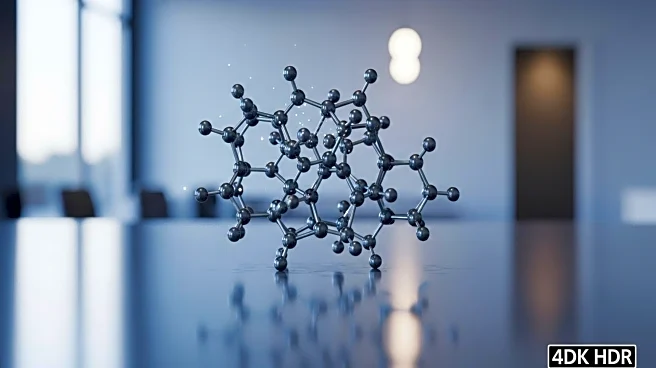What's Happening?
The Nobel Prize in Chemistry has been awarded to Susumu Kitagawa, Richard Robson, and Omar M. Yaghi for their pioneering work on metal-organic frameworks (MOFs). These frameworks are a new form of molecular architecture capable of absorbing and containing gases, which could significantly aid in reducing pollution and combating climate change. The Nobel Committee highlighted the frameworks' potential to capture carbon dioxide and extract water from dry air, likening their capacity to Hermione Granger's enchanted handbag from the 'Harry Potter' series. The scientists' work, which began in 1989, has led to the development of materials that can separate 'forever chemicals' from water, offering a promising solution to environmental challenges.
Why It's Important?
The recognition of metal-organic frameworks underscores their potential to address some of the most pressing environmental issues. By capturing carbon dioxide and other pollutants, these frameworks could play a crucial role in mitigating climate change and improving air and water quality. The ability to separate harmful chemicals from water could lead to cleaner water supplies and reduced health risks associated with chemical exposure. The award highlights the importance of innovative scientific research in developing sustainable solutions to global environmental challenges.
What's Next?
The award is likely to spur further research and development in the field of metal-organic frameworks. Industries may increase investment in these materials, exploring new applications such as hydrogen storage and rare earth metal capture. The scientific community is expected to continue expanding the variety of MOFs, potentially leading to breakthroughs in environmental technology and materials science. The recognition may also encourage collaboration between academia and industry to accelerate the practical implementation of these frameworks.
Beyond the Headlines
The development of metal-organic frameworks represents a significant advancement in materials science, with implications beyond environmental applications. The frameworks' ability to be customized for specific functions opens possibilities in various fields, including pharmaceuticals and energy storage. The award highlights the importance of interdisciplinary research and the potential for scientific discoveries to drive technological innovation and societal progress.











